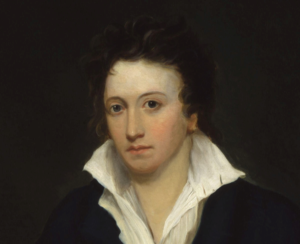

Percy Bysshe Shelley is known as one of the preeminent Romantic English poets of the 19th century. Though he only lived to be 29 years old, he is regarded by many to be one of the most influential poets of the English language. His moving work “Bereavement” is a poem that describes an unnamed man’s response to the death of a loved one. We don’t know who the person who died was — whether they were the man’s father or mother, a lover or a dear friend. Nor does it matter. The unnamed man in the poem clearly had a deep love for the person.
The first stanza gives us an image of a man deeply pained by the death of his loved one:
How stern are the woes of the desolate mourner
As he bends in still grief o’er the hallowed bier,
As enanguished he turns from the laugh of the scorner,
And drops to perfection’s remembrance a tear.
That Shelley chose the word “stern” points to the fact that a bereaved person may appear rude and unfriendly to others. This is a natural reaction to the negative emotions we feel when confronted with the death of a loved one.
I love the line that closes out that first stanza. “And drops to perfection’s remembrance a tear.” What a beautiful statement, particularly if the person who died was the love of this man’s life. Love is the most powerful human emotion. Unfortunately, love can also be a curse when someone you love deeply dies. Every human deserves to have someone they view as “perfection” in their life, much like the man in “Bereavement” did.
Shelley continues to examine the man’s mental state as he comes to accept the loss of his loved one.
When floods of despair down his pale cheeks are streaming,
When no blissful hope on his bosom is beaming,
Or, if lulled for a while, soon he starts from his dreaming,
And finds torn the soft ties to affection so dear.
 Again Shelley describes the man’s lamentation with brilliant word choice. The man is so clearly overcome with grief that the tears are literally streaming down his cheeks. He falls asleep to achieve some respite from the pain, yet wakes to realize the loss is still real. The “soft ties to affection” are still ripped to shreds, and the overwhelming heartbreak has returned.
Again Shelley describes the man’s lamentation with brilliant word choice. The man is so clearly overcome with grief that the tears are literally streaming down his cheeks. He falls asleep to achieve some respite from the pain, yet wakes to realize the loss is still real. The “soft ties to affection” are still ripped to shreds, and the overwhelming heartbreak has returned.
Like many poems about death, “Bereavement” gets more difficult to read the more often you read it. Shelley’s word usage and imagery paint a picture of despair, sadness and overwhelming grief, a feeling many of us have experienced following the death of a loved one. As sad as that is, I think there’s also something positive to take away from the fact that, as humans, we can love and feel emotions in such a profound way. Losing a loved one is terribly painful. But we can at least find solace in the fact that the potential to love is a strong, wonderful and beautiful thing.

 “Bereavement,” By Percy Bysshe Shelley
“Bereavement,” By Percy Bysshe Shelley


 Passing of Beloved Comedian Births a New Comedy Festival
Passing of Beloved Comedian Births a New Comedy Festival

 The Spiritual Symbolism of Cardinals
The Spiritual Symbolism of Cardinals















hi, my name is Chaganti Subbarao. I am very happy to read this article and poems. what a good statement in the poem “And drops to perfection’s remembrance a tear.” I love this line very much. I’m excited about the word as a poet. thank you
Report this comment
To find Shelly’s poem when one’s own heart is shattered imparts to me a different perspective on poetry. That poetry can soothe and heal and take the broken heart and make of it a wondrous sacred thing
Is amazing . And I need to be amazed
Report this comment